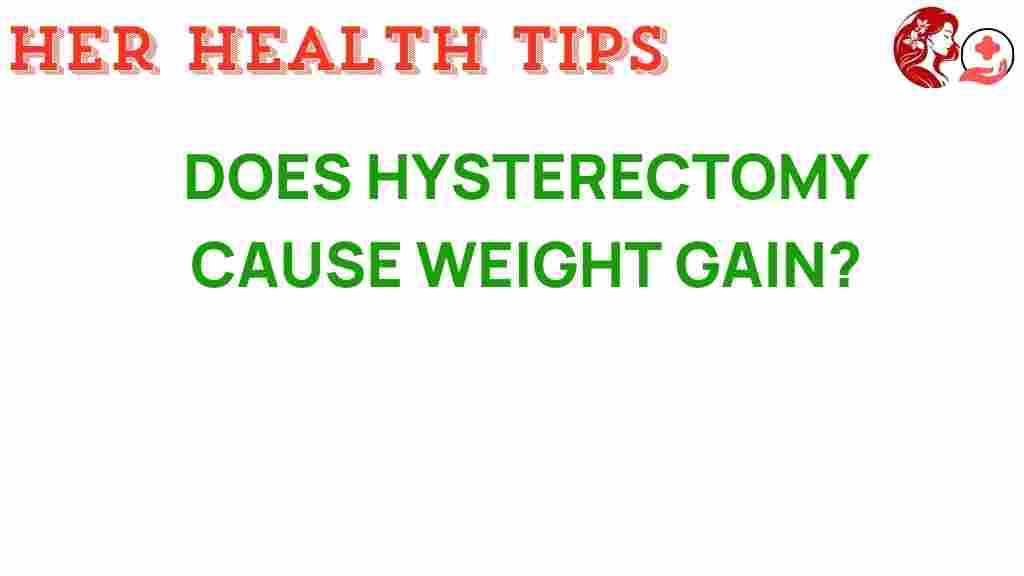Unpacking the Myths: Does Hysterectomy Cause Weight Gain?
Hysterectomy is a surgical procedure that involves the removal of the uterus and is often performed for various medical reasons, including fibroids, endometriosis, or cancer. One of the prevalent concerns among women considering this surgery is whether a hysterectomy will lead to weight gain. In this article, we will explore this topic, focusing on the connections between hysterectomy, weight gain, women’s health, hormonal changes, post-operative care, body image, and recovery.
Understanding Hysterectomy and Its Types
A hysterectomy is not a one-size-fits-all procedure; it can vary greatly depending on the patient’s needs. Here are the main types:
- Partial (Subtotal) Hysterectomy: Removal of the uterus while keeping the cervix intact.
- Total Hysterectomy: Removal of the entire uterus and cervix.
- Radical Hysterectomy: Removal of the uterus, cervix, surrounding tissues, and sometimes the ovaries and fallopian tubes, typically performed in cancer cases.
Each type of hysterectomy can have different implications for a woman’s body, particularly regarding hormonal changes and weight management.
The Link Between Hysterectomy and Weight Gain
Many women report weight gain following a hysterectomy, but attributing this change solely to the surgery can be misleading. Several factors play a role in post-operative weight management:
- Hormonal Changes: Removal of the ovaries during the procedure can lead to hormonal imbalances that may affect metabolism and body weight.
- Physical Inactivity: Recovery from surgery often requires a period of limited physical activity, which can lead to temporary weight gain.
- Dietary Changes: Emotional and physical stress from surgery can lead to changes in eating habits, often resulting in weight gain.
Hormonal Changes and Their Effects
One of the most significant factors related to hysterectomy and weight gain is hormonal changes. When the ovaries are removed, the body experiences a decrease in estrogen levels, which can lead to:
- Increased fat storage, particularly around the abdomen.
- Changes in metabolism, making it easier to gain weight.
- Potential mood swings, which can lead to emotional eating.
It’s crucial to understand that not all women will experience these changes, and those who do can manage them with proper post-operative care.
Post-Operative Care and Recovery
Effective post-operative care is essential for a smooth recovery and maintaining a healthy weight after a hysterectomy. Here are some key aspects:
1. Follow-Up Appointments
Regular follow-ups with your healthcare provider are crucial. They can monitor your recovery and address any concerns, particularly regarding hormonal therapies.
2. Nutrition
Maintaining a balanced diet post-surgery can help manage weight. Focus on:
- High-fiber foods: fruits, vegetables, and whole grains.
- Lean proteins: chicken, fish, legumes.
- Healthy fats: nuts, seeds, avocados.
3. Physical Activity
Gradually reintroducing physical activity into your routine can aid in weight management and improve overall health. Consider:
- Walking: Start with short distances and gradually increase.
- Strength training: Helps build muscle mass and metabolism.
- Yoga or Pilates: Beneficial for flexibility and stress relief.
Body Image and Emotional Well-Being
Weight gain or changes in body shape post-hysterectomy can impact a woman’s body image and emotional health. It’s important to address these feelings:
- Talk About It: Share your feelings with a trusted friend or therapist.
- Support Groups: Consider joining a group for women who have undergone similar surgeries.
- Self-Care: Focus on activities that promote mental well-being, such as meditation, art, or journaling.
Troubleshooting Weight Gain After Hysterectomy
If you find yourself gaining weight after a hysterectomy, here are some troubleshooting tips:
1. Assess Diet and Lifestyle
Keep a food diary to track what you eat and identify any patterns that may lead to weight gain.
2. Evaluate Physical Activity
Ensure you are incorporating regular exercise into your routine. If you’re unsure where to start, consult a fitness professional.
3. Consult with Your Doctor
If weight gain persists, it may be beneficial to discuss it with your healthcare provider. They might recommend:
- Hormonal therapy options to help balance your hormones.
- Nutritionist consultations for personalized dietary plans.
Conclusion
In summary, while many women express concerns about weight gain after a hysterectomy, it is essential to understand that the surgery itself is not the sole factor. Hormonal changes, lifestyle adjustments, and emotional well-being all play significant roles in post-operative weight management. By focusing on effective post-operative care, maintaining a balanced diet, and gradually increasing physical activity, women can navigate the challenges of recovery and work towards maintaining a healthy weight. For further information on women’s health and surgery effects, consider visiting WomensHealth.gov for resources.
Remember, each woman’s experience is unique, and open communication with healthcare providers can help address any concerns regarding hysterectomy and weight gain.
This article is in the category Conditions and created by HerHealthTips Team
